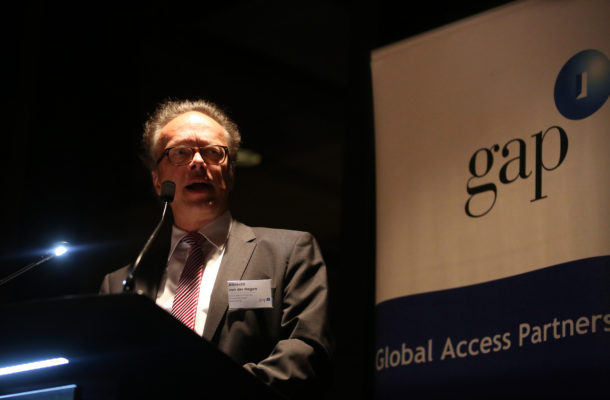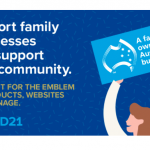Secret of success for midsize business: family entrepreneurs

Albrecht von der Hagen, Chairman of the Management Board of Germany’s Association of Family-Owned Businesses addressed delegates on Germany’s Mittelstand which has built its resilient economy, at the GAP Summit dinner on 7 September, 2017. It is a pleasure to share his speech with you, here:
Thank you so much for this very kind introduction. I want to thank you Catherine, for the wonderful invitation. I am very glad to participate in this great summit about midsize business and ‘hidden giants’.
When Catherine asked me to come to this summit, I had in mind one important fact about the Australian economy – you haven’t had a depression for the last 26 years! 26 years with steady growth. You live in a paradise! Nevertheless, Catherine insisted that it is important to discuss the chances of midsize business and ‘hidden giants’. I am happy to be in your fascinating country.
For more than 20 years, I have been dealing in Germany with this most interesting topic; midsize business. I am responsible for the association “Die Familienunternehmer”, which means “Family-Entrepreneurs”. Our members are the managing partners of midsize business. Many of them are active on the international markets.
When I arrived at Sydney airport I had to pass the duty-free shop. For some that may be annoying, for me it was a very nice welcome because this shop belongs to one of our members; the Heinemann Family in Hamburg – a midsize business. In Germany midsize business and family-owned business are a decisive factor of our economic strength. We call these businesses; “Mittelstand”.
When I speak of family-owned companies or family businesses, they always include a member of the family as a managing partner or the chairman of the supervisory board. Family business means the company is managed by the family. When we speak about midsize business or Mittelstand, that includes even companies which can have a turnover of more than a billion Euro; for example Miele or the specialist for farm machines Claas. Both are family businesses.
How can these companies grow to be ‘hidden giants’? How can they be successful in international business? How can Mittelstand be the heart of economy? What are the secrets of success? The main players in German Mittelstand are the family businesses. I would like to talk about them tonight.
Firstly, family-owned companies are very special. They are probably the oldest form of organisation for human business activities. Family business sounds quite old-fashioned. But a business model that has survived for thousands of years is worth looking at. To understand the essential role of our family-businesses for our national economy here are a few figures. In Germany we have about 180,000 family-owned companies with more than 10 employees. Family businesses represent almost half of the overall German sales volume and they offer more than half of all jobs.
What is even more important, they are the instructors of the nation. They train 80% of all apprentices in Germany. This enormous amount of vocational training is an important key to their success. Well trained skilled-workers constitute the strength and foundation of any company. Perhaps you have heard of our special vocational training system which is instrumental to delivery these efforts. We call it the Dual System. This means that practical training takes place in-company, while additional, apprentices attend specialised public vocational schools. After 3 years they have to pass a public exam at the regional chamber of industry and commerce. The big family-owned companies are real job machines, they increased the number of jobs since 2006 by 19%, while jobs in public companies only grow by 2%.
We are often asked about the size of midsize family-owned companies. It is not the size of the company which matters. It is ownership. What is special about owner managed companies is the fact that risk and liability are ideally assumed by one person. This means the owner is responsible for his company. If he takes too many risks he will loose not only the company assets but also his private assets. Responsibility thus has a name and a face. The owner is and feels responsible to his employees. Some of the worker-families work for the company in the second or third generation. That strengthens loyalty. And finally, the owner is responsible to his family. The ownership of the company is held by one family and is a long-term- commitment, planned for generations. That means, the owner wants to transfer his company in good condition to his children. He has to find the best way between risks and innovation.
Because of this long-term perspective and because of the different forms of responsibilities, the typical German family entrepreneur often acts differently to how the rules of capitalism would suggest. Quite often, the family-entrepreneur decides differently than to what the stock markets or analysts would predict. Unlike public-companies, family-entrepreneurs don’t base their decisions on quarterly-results but rather on long-term-strategies for generations. A further point in which they differ from public companies is the equity-ratio. On average all public-companies in Germany have an equity-ratio of 36%. The big family businesses on the other hand can boast a rate of 50%. So, to an amazing extent for financing innovation and growth our family entrepreneurs rely on their own efforts. They strive to be independent of banks and private-equity funds as much as possible because a high equity-ratio helps to stay crisis resistant and self-determined.
Another factor of the formula for success; in the big 2008/2009 crisis many family entrepreneurs did not fire those employees who were not needed. Of course, family-entrepreneurs are no greater philanthropists than any other business leader but many of them had in mind that it would be very difficult to get well-trained experts back on board, as soon as their special-markets recovered. With high equity and without the pressure of the stock markets they could afford to keep their employees on the payroll. And indeed at the end of the crisis our family-businesses were able to grow quickly, while many competitors could not take the incoming offers. These strategies make them anchors of stability even in times of crisis and it pays. They have a much higher reputation than public companies.
A further point; family entrepreneurs pay much more attention to customer value than to shareholder value. Those family businesses that are successful on international markets expect their top management to have very close ties to the customers. In fact, there is some evidence that the top-management of successful family businesses have five times more contact with customers than the top management of public companies. Family entrepreneurs live in a system that allows them, and forces them, to have their very own fixed set of values. It is almost its own philosophy. It is the family business philosophy of long-term sustainability and responsibility. This is one reason for their long-term success.
As you well know, export is very important for the German economy. The majority of this export success is generated by the Mittelstand; two thirds of our exports originate from midsize companies. This is quite different to the US or France, for example. In our country it holds true; mid-size is beautiful! The key to the German export success are our so-called ‘Hidden Champions’. “Hidden” – because they are mainly unknown to the public. “Champions” – for they are world market leaders, who achieve success with niche products. Hidden Champions are midsize businesses. Most of them come from the mechanical engineering and electrical industries. But other niches of the world markets are covered as well.
One example from Germany is a small family-owned company – they are the only company worldwide, manufacturing curtains for large theatres and opera houses. I suppose the curtains at the Sydney Opera House come from this specialised company. The niche on the world market can well be small, but these companies obtain the required “Economy of Scale” just through their global business.
Recently, a study was undertaken to find out which countries also have these ‘Hidden Champions’. Worldwide, the study counted 2,700 of these very special world market leaders. Almost half are located in Germany. To make it comparable, the study measured how many ‘Hidden Champions’ there are per 1 million inhabitants. Germany has a rate of 16. But France, Great Britain and Italy, the other big economies in Europe, show little more than a rate of 1. The USA is 1 also one per million inhabitants, and according to this study Australia has a rate of 0.5 ‘Hidden Champions’.
For a national economy to do well, you don’t necessarily need to have these ‘Hidden Champions’. But when you live on a continent like Europe, without significant natural resources, it is very helpful for the wealth of a nation to be able to fall back on these ‘Hidden Champions’. They hold more patents than other companies and are drivers for innovation. Peter Fritz knows well to what extent innovation is the lifeblood of ‘Hidden Champions’.
I tried to find an explanation as to why family businesses are so innovative. Our association asked our members about their education backgrounds. Almost 50% studied engineering or a natural-science. Perhaps all of us should discuss with our teenage children the option of studying at a technical university. I’ve heard you have an excellent one in Sydney.
‘Hidden Champions’ love their products. They insist on high quality because product leadership, as well as market leadership, pays off. And most family entrepreneurs understand their products deeply and are aware of their customer’s expectations. Many family-owned companies are surprisingly successful in the high-tech sector. This is astonishing, because the high-tech sector is very capital intensive.
How can family-businesses finance such capital intensive research and production? Family-owned companies gather capital often spanning generations. Only a very small part of the profits is distributed to the family. In most instances, the overwhelming part is accumulated and then used to finance innovations, investments and growth. But a prerequisite is that the inheritance tax does not tax business assets. This way, midsize family-businesses can compete with public multinationals.
What drives these family entrepreneurs? The owners of family businesses often feel that they are links in a chain, obligated to their parents as well as to their own children. A family business can be compared to a tree; each generation can harvest the fruit and maybe cut away dried-up branches but shall never lay hands on the trunk. And in particular, when the number of people that are supposed to live from the fruits of this tree grow, all family members are expected to nurture the tree in a way that it grows as well. Family entrepreneurs are deeply proud when they can say that they transferred the business to the next-generation in better shape than when they received it. For these companies the emotional value of ownership is also an important factor.
Naturally, the desire to make money is a prerequisite. However, in most cases this is not the highest priority. More important than a fast and high profit, is the long-term preservation of the company for the next-generation. In Germany, it is not uncommon to find companies managed by the fifth or sixth generation of one family. One of the oldest is in the 32nd generation. The founder of Ikea, Ingvar Kamprad once put it in a nutshell; “The motivating force is to realise your dreams. And to do something for someone dear to you”. So, it is not only the dividends that count, but the ‘Emotional Values’ to keep a business in the family for the next generation. I call that the emotional dividend; being proud of your company, being proud of your products or your brand, and the feeling of happiness to be able to transfer something great to your children.
Tradition and emotion are important, but even more important for family businesses is the ability to be flexible and disruptive along with having the ability to transform when necessary. So traditional skill-sets had to be further developed. One example is the watch manufacturers in the Black Forest, producing the well-known cuckoo-clocks. The heyday of the cuckoo clock has been over for a long time. However, the precision ‘know how’ of these watch manufacturers was then transferred to developed new techniques. Today, you will find numerous companies, specialising in medical technology in this part of Germany, among them many world-market-leaders.
Traditionally, the high level of vocational training in Germany is an important factor. Many of our exporting Mittelstand companies manufacture individual pieces, tailor-made to a customer’s requirements. For this you need excellent skilled-workers. Right now in Germany legions of Chinese investors and American investment funds roam the country seeking to buy out the German Mittelstand. Why is it that even widespread families with several hundred partners do not accept these highly attractive offers? Many family businesses have a code, that members are only allowed to sell their shares to other family members. Within the family, however, these shares are not sold at market-value but at a significantly lower price, which has been determined at an earlier stage. This shared commitment and the cultivation of family cohesion define a successful family business. Since these family businesses are a closed society, outsiders hardly stand a chance to buy up these companies.
However, the biggest threat to family-owned companies is politics. To be more precise, the lack of predictability of political decisions. This is one of the important reasons why entrepreneurs get actively involved in business associations such as ours. These past years we have championed hard for a German tax system that strengthens family businesses. During his lifetime, the entrepreneur has to bear a relatively high tax burden, but once succession is opened it is possible to transfer the family company with all its assets to the next generation without high-taxes being levied. The United States are an example of a totally different approach. Here, an altogether different philosophy prevails; “Every man is the architect of his own fortune”. For this reason, an entrepreneur is taxed only lightly during his lifetime which allows him to amass great personal wealth, just look at Marc Zuckerberg or Jeff Bezos.
However then, at the end of life things become prohibitively expensive. The inheritance-tax, levied in the US, makes it extremely difficult to transfer a company to the next-generation. Many entrepreneurs therefore then sell their companies and spend their money, others choose the legal structure of a trust. But very soon, these trusts are run only by managers, not by the entrepreneur or owner himself. Bad politics can stall or even destroy family businesses; in Italy for example, there are very rigid labour laws, which make it extremely difficult for companies to grow to more than 25 employees. However, when there is no competitive pressure from the bottom up, even the bigger companies become weaker. There is nothing more motivating than strong competition. In France there is an unfortunate mix of extremely high taxes and a very rigid 35 hour work week. The results; the unit-labour costs are not competitive at all.
Intelligent and reliable political-framework is crucial so that owner managed midsize companies can develop. It is the core business of our association to fight for good economic policies. For that, I’m in talks with chancellor Merkel, finance-minister Schäuble and other politicians. The basis for the success of German Mittelstand are economic freedom, competition, and protection of property and ownership. That means family entrepreneurs need:
- political commitment for competition and prevention of cartels, monopolies and state-owned companies
- no taxation of assets when the company is transferred into the next generation
- no uncompetitive labour-unit costs and no inflexibility on the labour-market
- no protectionism, but free-trade agreements
- close links between universities and companies.
Beside the political framework, the recipe for the success of family entrepreneurs consists in the end of many different ingredients. And there is no one-size fits all solution. Also, it depends on the cultural background, but family entrepreneurs have in common:
- personal responsibility with risks and liabilities of the owner
- financial independence by high equity
- extremely long-term view to the next-generation
- close bonds to his employees
- obsession with quality
- more attention to customer value than to shareholder value.
Mittelstand and family businesses are a big chance for sustainable management, and they are a big chance for a resilient economy. Politics, science and entrepreneurs must work together closely to support Mittelstand. With this summit, organised by Global Access Partners, you are sending a strong signal. And I am glad to be given the opportunity to participate in this event. Midsize business is an issue attracting more and more attention in the international arena. It has become increasingly important, and it would be fantastic if we could exchange our ideas and experience more intensely in the future.
Albrecht v. der Hagen is Chairman of the Management Board of of the Association of Family-Owned Businesses, Germany. This association advocates responsible regulatory policies and is well-known to politicians and journalists by virtue of its public strategic campaigns. Albrecht has always worked at the interface between business and politics; as head of the communications department of the Federation of German Industries, and as economic advisor to the Governing Mayor of Berlin. Albrecht v. der Hagen studied Economics, Constitutional Law and Modern History (M.Sc. econ + M.A.) in Bonn, Berlin and London.







